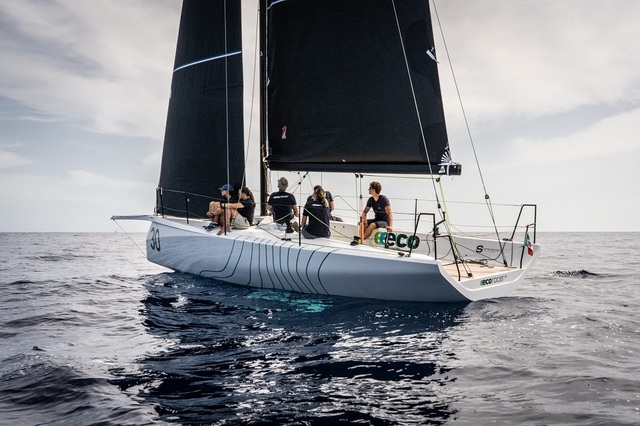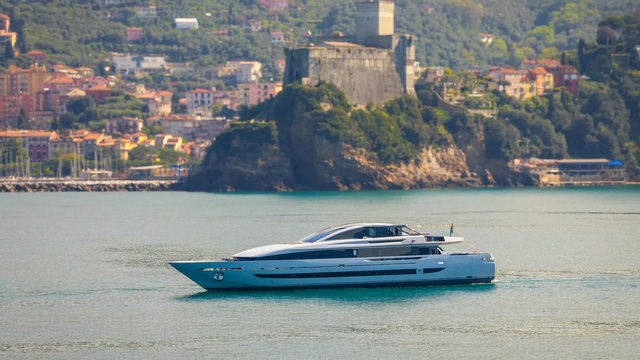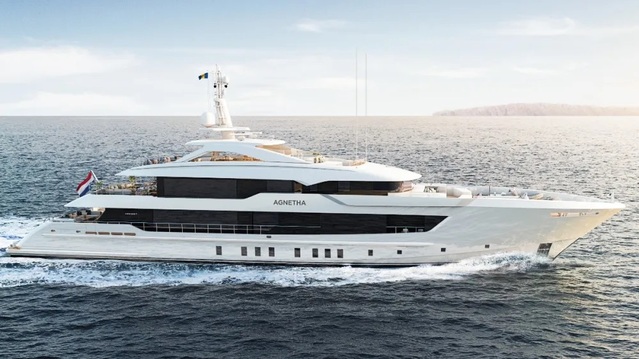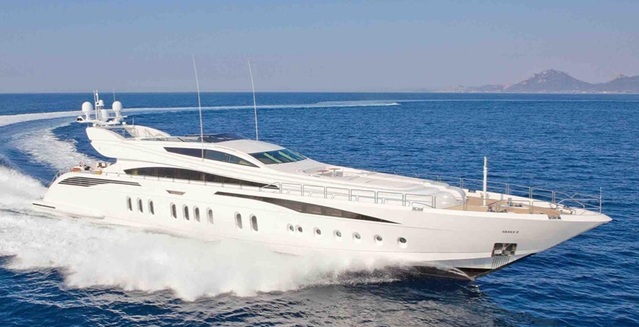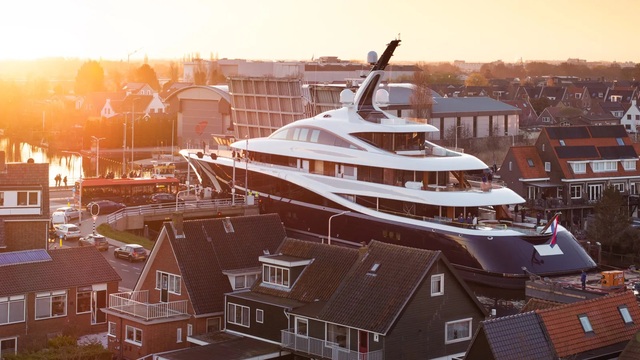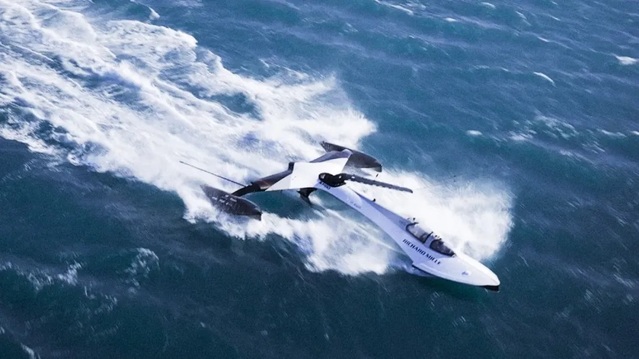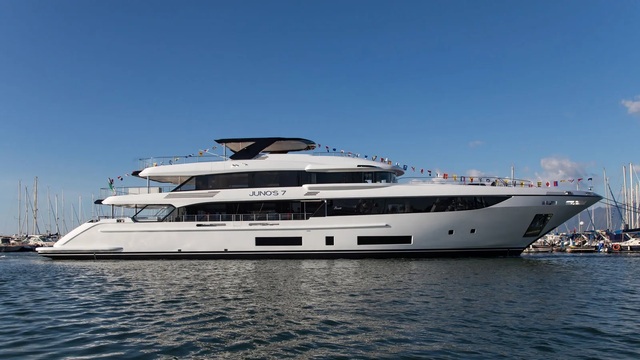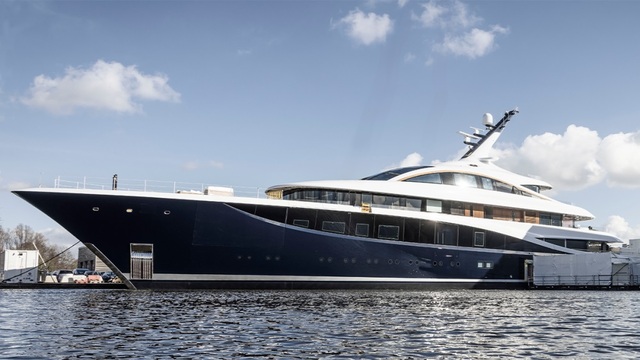- ECO Yachts is the first boatyard to produce boats whose climate neutrality has been verified by a third party.
- A Spin-off of nlcomp, the start-up that created and patented 'rComposite™', the first recyclable composite material for the boating industry.
- Honorable mention at the Design Innovation Awards of the 63th Genoa International Boat Show.
- The next model will be a fast cruiser, with a LOA of approximately 12 meters, and the range will also include motorboats.
Announced at the Genoa International Boat Show the birth of ECO Yachts, the first shipyard in the world to produce climate neutral boats. All models of the ECO Yachts brand, including the ecoracer 30 recently launched during the final of The Ocean Race, will in fact be produced in such a way as not to alter the natural balance of CO2, methane and other climate-changing gases.
Climate standard, following the methodologies described by the Green House Gas Protocol, ISO 14067 and PAS2060, will verify the climate neutrality of the boats.
In line with the transparency and sustainability values embodied by the brand, ECO Yachts has publicly released emissions data of the ecoracer30, along with the offsetting strategy and emission reduction plan.
The founders of ECO Yachts are the visionaries behind nlcomp, the creators and patent-holders of the recyclable composite material rComposite™, which will be used in all of the brand's boats. The boats will be manufactured in Monfalcone, Italy. A second ecoracer30 is currently in production, with delivery scheduled for the end of October.
During the Genoa International Boat Show, Eco Yachts won his first prize: an honourable mention in the Design Innovation Awards for “demonstrating what it means to take a prototype and move it into
industrial production, using experimental techniques and sustainable materials.”
Fabio Bignolini said: "After the launch of the ecoracer30, we believed it was time to introduce a brand dedicated to sustainable boats. We will manufacture these boats by applying the expertise our team gained during the development of rComposite and the production of our first prototypes.
In addition to using a recyclable composite material, we have taken a further step towards comprehensive sustainability. This includes the use of recyclable molds, state-of-the-art sails, and advanced propulsion systems.
We have also calculated the emissions generated during the production of the ecoracer30, and we will offset these emissions by investing in selected projects. However, measuring and offsetting is just the first step. With the support of the climate standard team, we will implement an emission reduction plan that will be made public."
The philosophy of the range
The next model of ECO Yachts will be a fast cruiser, with a LOA of approximately 12 meters, that will set a new standard for environmentally friendly sailing. A motor yacht range will also be developed, to be announced in 2024.
The hulls of these boats will be designed with the aim of facilitating end-of-life dismantling, following the principle of 'designing for disassembly'. Thanks to the adoption of rComposite technology, available for licensing to every shipyard, it will be possible to recycle and give a second life to the composite material used to build the hulls.
Every aspect of the design process, including the selection of materials, will be aimed at minimizing weight to allow optimal sailing in all conditions and reduce the use of engines.
On board, the equipment and systems will be powered by renewable sources: solar, hydraulic and wind energy.
The use of solar panels is now widespread on many sailing yachts and catamarans, while hydro-generation is finding more and more applications. This is a system in which the electric motor, powered by the motion of the water, recharges the on-board batteries. Hydrogeneration has also found application on large sailing yachts, including the Baltic 142' Canova.
Among the choices that will reduce ECO Yachts' emissions are partnerships with One Sails and Breton. One Sails supplies 4T Forte™ sails, currently the only recyclable sails on the market. They can be easily recycled and reused for the production of accessories such as sail components, markers or sunglasses. Breton, on the other hand, will guarantee the recyclability of the moulds used to produce the boats. Thanks to the Genesi 3D printer, Breton will in fact be able to produce easily recyclable moulds through additive manufacturing.
For the design of the new fast cruiser, ECO Yachts will rely on the expertise and experience of Matteo Polli, who also designed the ecoracer30, the first boat to carry the new brand's logo.
Fabio Bignolini looks further ahead, announcing, "with ECO Yachts, we will also enter the world of motorboats. We are planning a new line, the first model of which will be a foiling boat with electric propulsion, specially designed as a tender for megayachts. Everything will be designed, engineered and produced in Italy."
Reducing and offsetting emissions
The climate-neutral strategy for the ECO Yachts models has been verified by the independent verification body Climate Standard. The assessment covers the entire production process, from the sourcing of raw materials to the delivery of the boat to the customer, ensuring that all emissions of CO2 and other greenhouse gases will be offset.
As part of their company philosophy that considers transparency essential for sustainability, ECO Yachts will make these certifications public. This means that not only the company's customers, but also industry enthusiasts will be able to access data on polluting gas emissions and monitor the progress of emission reduction projects.
"Over the past few years, we have successfully developed and adopted recyclable composite materials, which have served as an inspiration to other brands in the nautical industry now venturing into similar technologies. The next step we are taking enables us to guarantee that the boats we produce have no negative impact on the environment.
For us, launching a climate-neutral product is a significant declaration of our commitment to sustainability. Similarly, when boat owners choose a carbon-neutral boat, it demonstrates their strong dedication to environmental awareness.
Climate Standard verified the annual emissions in tonnes of CO2e, considering both direct and indirect emissions, including those from suppliers. This measurement will be followed by the implementation of initiatives aimed at reducing the climate footprint and offsetting unavoidable emissions. The public certification also outlines the emission reduction strategy and identifies key members of the ECO Yachts team responsible for achieving and pursuing these goals.
Pietro Spataro, CEO of Climate Standard, explains, 'Climate neutrality means that a company takes responsibility for its emissions by offsetting not only CO2 emissions but also the other five main greenhouse gases. This offsets the negative effects on the climate.’
"The European Commission issued a proposal for a directive in March that highlighted the illegality of self-declarations in environmental sustainability issues, thus necessitating a third-party verification body.
In addition to being in line with European directives, involving a dedicated company to verify this status also means being credible towards the customer. In fact, a survey has shown that 60% of consumers do not consider companies' green self-declarations to be reliable."
rComposite and the future of nlcomp
The patented rComposite technology, developed by nlcomp and available for licensing by any shipyard, is finding applications in various sectors. Currently, it's being used to prototype wind turbine blades and components for other industries such as cooling tower elements.
A new partnership with Sangiorgio Marine was announced during the show: nlcomp will build some components of a new Class40 together with Sangiorgio Marine, and will assist Edoardo Bianchi's team in analyzing and assessing the environmental impact of the boats produced.
In light of nlcomp's future plans and the goal of mass-producing sustainable boats, a distinctive brand specializing in boat production and marketing has been established: this is the reason behind the birth of ECO Yachts.
NLcomp's mission will stay consistent with what it has been until now: to address the challenge of end-of-life glass fiber composites and promote a new circular economy in the composites industry.
To achieve this, nlcomp will continue to develop rComposite and explore its potential applications, while ECO Yachts is dedicated to turning the often-abused concept of sustainable yachting into a reality.
| Παρουσιάσεις Προϊόντων - More Articles... |
|
|








